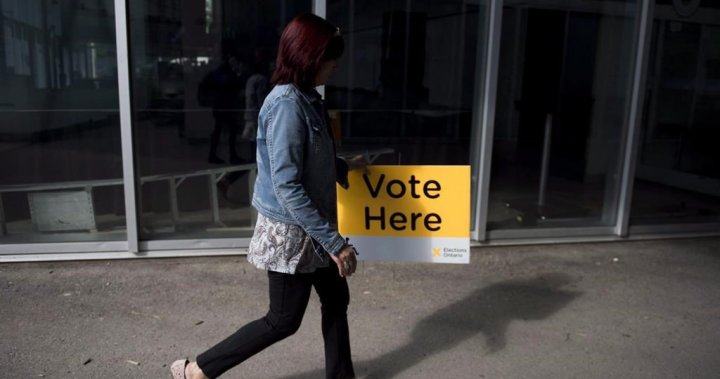Summarize this content to 2000 words in 6 paragraphs
Despite facing critical issues like student debt, job insecurity, and housing unaffordability, many of which are shaped by provincial policies, young Ontarians continue to have the lowest voter turnout of any demographic.
In the last federal elections, turnout among voters between the ages of 18 and 24 was below 54 per cent, dropping to just 47 per cent in the 2021 snap election, according to Elections Canada data.The recent decline highlights growing concerns about voter engagement, and why the majority of voters in the 18 to 24 demographics are not showing up to vote.Jaden Braves, 16, CEO of Young Politicians of Canada, says young people don’t see the point in voting because they feel political parties fail to take action.“There is a lack of hope, a lot of pessimism and misinformation. Nobody seems to be taking action,” he says. “Young people don’t trust the system.” A survey conducted by Young Politicians of Canada found that 70 per cent of youth have actively advocated for issues they care about, but the majority of them do not vote.“We are protesting and advocating for causes we care about, but don’t believe voting will lead to real change,” added Braves.Social media plays a major role in shaping political awareness with 40 per cent of Ontario students getting their news from TikTok,” Braves said, sourcing a study done by his organization. “Much of the turnout issue has to do with the negativity and misinformation we see online. Social media is not for solutions. It fosters a lot of negativities.”
Get breaking National news
For news impacting Canada and around the world, sign up for breaking news alerts delivered directly to you when they happen.
Political science experts echo these concerns.Nelson Wiseman, a professor emeritus at the University of Toronto, sees youth disengagement as a global issue.“Adults are much more concerned about the political situation. Young people are less likely to care even though provincial policies directly impact them,” Wiseman said.He believes many young people don’t see politics as relevant to their daily lives. “I suspect they don’t spend much time talking about politics, so why would they go out and vote?”Wiseman emphasized that while social media is useful for awareness, it can also create an illusion of engagement. “People may feel like they’re participating by sharing posts or commenting online, but that doesn’t often translate to real-life action,” he says.Another challenge which Braves believes has fostered a low voter turnout in Canada is the lack of civics education and awareness of the voting process.
“We need to have accessible voting in all communities,” Braves says, pointing to gaps in the education system. “Civics in Ontario comes up in Grade 10, and then you never really see it again.”Braves believes that systemic issues discourage younger voters. “We’re not making sure our citizens are civically literate and aware of the political system,” he says.“Once politicians start to change that, there can be a better turnout.”Semra Sevi, a political science professor at the University of Toronto, emphasized the need for more efforts to educate and engage young voters. “Voter turnout is important because it reflects a healthy democracy,” she said.“Voting allows them to advocate for issues they care about like education, climate change, housing and job opportunities.”She feels the disconnect remains in the lack of civics education and effort from political parties to target younger voters.“Campaigns often focus on older demographics, and youth engagement remains secondary,” said Sevi.The impact of technology, particularly the meta-ban on Canadian news, has further disrupted access to political information. “Technology contributes to redirecting what people are taking in. If they’re not taking in politics, they are less likely to go vote,” says Wiseman.Sevi warns that low voter turnout among young people has long-term consequences.“When young people don’t vote, their priorities get ignored by politicians,” she says.Wiseman also points out that some political parties benefit from low voter engagement. “They do better if there is a lower turnout. They want to win,” he says. “Some parties have been very successful with low voter turnouts, so why should they encourage a high voter turnout?”“They just want to win,” Wiseman adds.Sevi, among other experts, suggest that Ontario politicians should prioritize digital outreach, social media platforms and incorporate youth perspectives into their policies.By expanding civic education, making voting more accessible and ensuring politicians, have campaigns that target young voters’ concerns, Sevi believes turnout from youth can prove.Ontario’s next election is coming full throttle and the question of whether young voters will head to the poll stands or not remains.
More on Politics
More videos
© 2025 Global News, a division of Corus Entertainment Inc.













